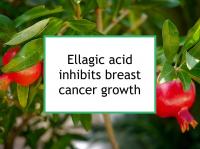Ellagic acid is a polyphenol found in numerous berries, pomegranates and other fruits and nuts. Cell and animal studies have demonstrated that ellagic acid and foods containing ellagic acid inhibit both estrogen receptor positive (ER+) and estrogen receptor negative (ER-) breast cancer growth and metastasis.
One study found that pomegranate extract inhibited the growth of HER2 overexpressing (HER2+) and triple negative (ER-/PR-/HER2-) breast cancer cells but not normal breast cells. The same study reported that pomegranate extract reduced the rate of tumor growth in mice bearing HER2+ tumors.
Ellagic acid has also been shown to inhibit a series of angiogenesis processes in breast cancer cells, including proliferation, migration, and tube formation. In order to grow beyond a very small size, tumors must induce angiogenesis, the growth of new blood vessels. This is a crucial step that separates preinvasive and dormant forms of cancer from invasive and metastatic growth. Blocking this step is one strategy for fighting cancer.
Sources of ellagic acid
While pomegranates are perhaps the most well-known source of ellagic acid, boysenberries, blackberries, and raspberries are also excellent sources. In addition, ellagic acid can be found in strawberries, currants, muscadine grapes, blueberries, cranberries, walnuts, and pecans. Generally speaking, whole food sources of ellagic acid have been found to have greater antiproliferative, apoptotic and antioxidant activities than individual components at the same concentrations, suggesting that compounds in the foods act synergistically compared to single purified active ingredients.
Pomegranate juice would appear to be an ideal source of ellagic acid were it not for the fact that pomegranates (and especially pomegranate seeds) are a significant source of a wide variety of phytoestrogens (plant estrogens). While pomegranate juice is beneficial, its estrogenic properties may make pomegranate harmful at concentrated dosages and we do not know the levels or conditions under which this might be true.
The safety and efficacy of consumption of large amounts of pomegranate juice, pomegranate seed oil and pomegranate extract needs to be confirmed in large-scale clinical trials. Therefore, we conclude that breast cancer patients, survivors and those at high risk can enjoy pomegranates and pomegranate juice in moderation, but should avoid "enhanced" pomegranate juice, pomegranate seed oil and pomegranate extracts.
Latest research finds mechanism of action of ellagic acid
The study referenced at the beginning of this news story was designed to investigate the inhibitory effects of ellagic acid on the growth of hormone receptor positive MCF-7 breast cancer cells. The authors first determined that ellagic acid inhibits MCF-7 proliferation primarily by inducing cell cycle arrest (in the G0/G1 phase). Gene expression profiling of MCF-7 cells line treated with ellagic acid for 6, 12 and 24 hours was then performed. This identified 4,738 genes that exhibited at least a two-fold change after 24 hours of treatment with ellagic acid.
The authors then performed additional analyses which confirmed that the changes in 16 of the genes belonged to the transforming growth factor-β/Smad3 (TGF-β/Smad3) signaling pathway. Generally speaking, the TGF-β/Smad signaling pathway plays a crucial role in the regulation of cell development, growth, and differentiation. The TGF-β/Smad3 pathway appears to be the molecular mechanism by which ellagic acid regulates MCF-7 breast cancer cell cycle arrest.
The authors conclude that the regulation of TGF-β/Smad3 pathway could provide a new approach for the treatment of patients with breast cancer. Further studies are needed to confirm the molecular mechanisms of ellagic acid in the inhibition or prevention of breast cancer growth.
Please see our articles on pomegranates and what ER+/PR+ breast cancer patients and survivors should eat for more information.
